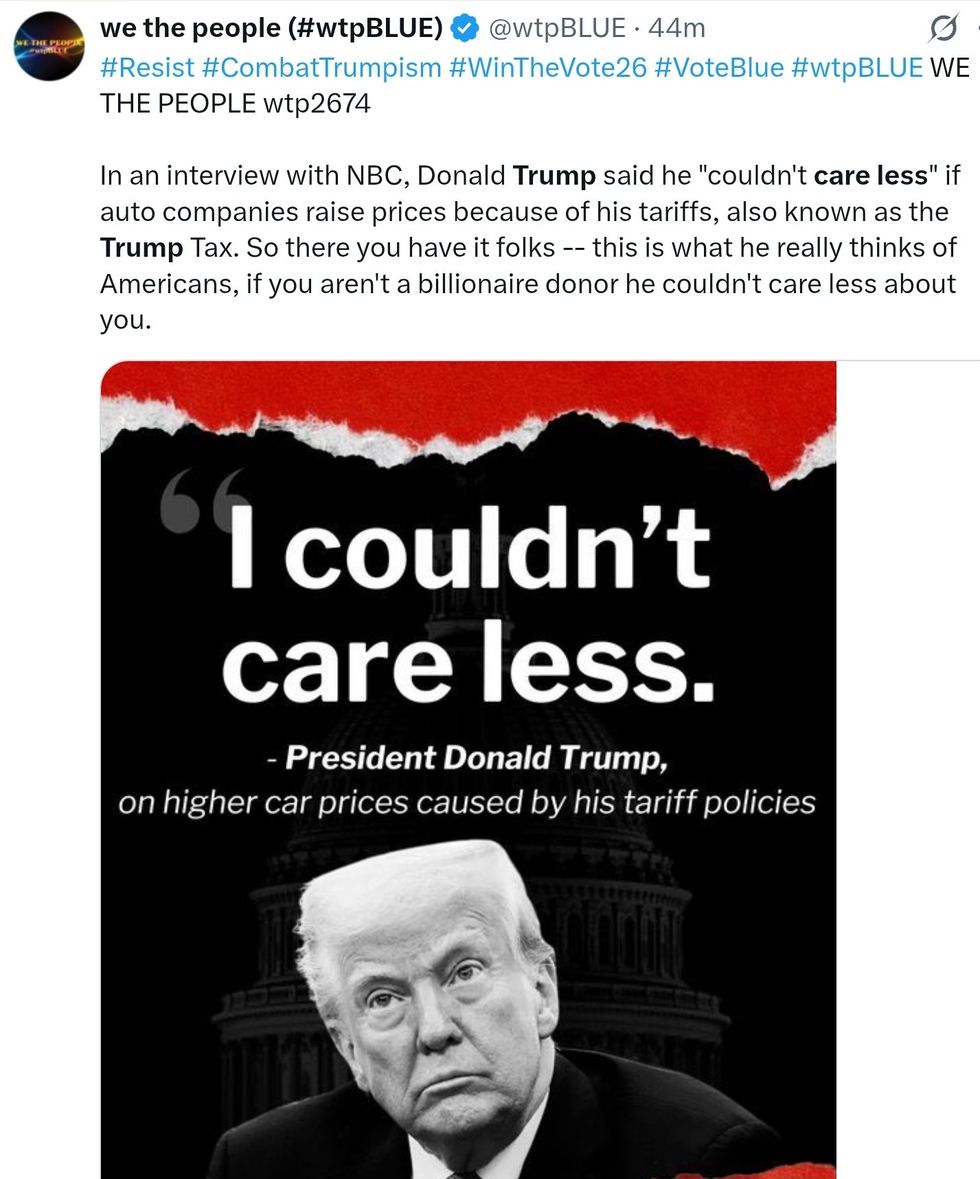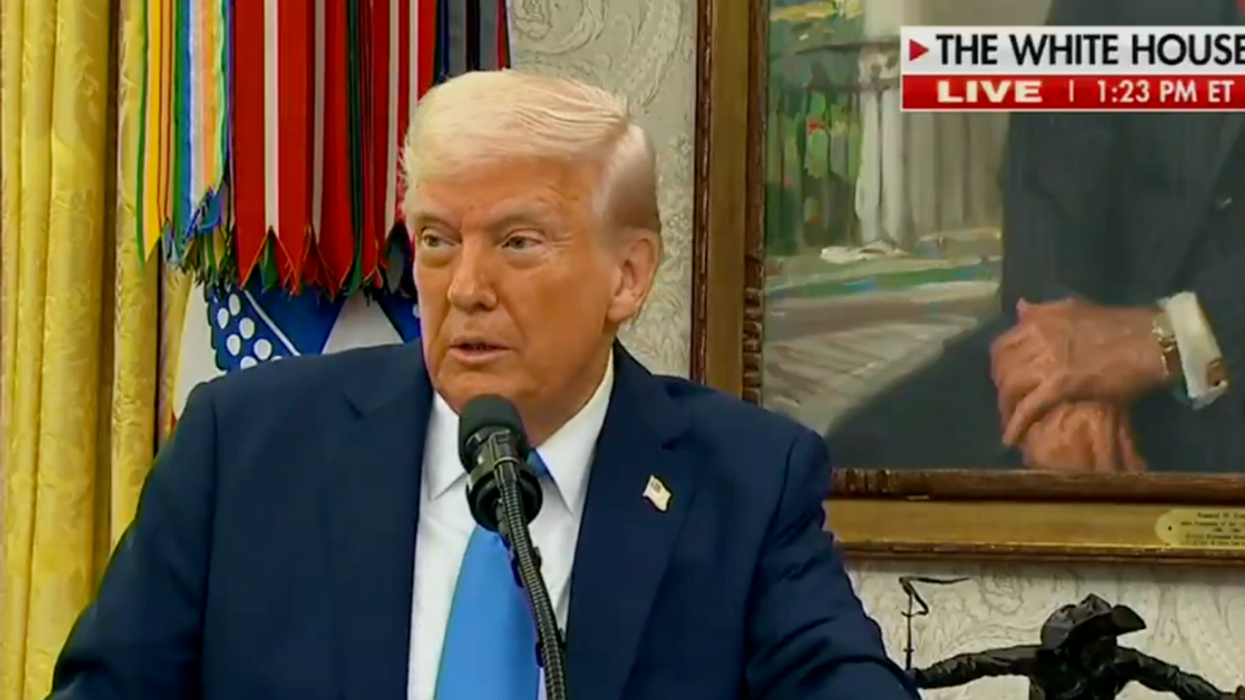Republican President Donald Trump said the quiet part out load again, admitting he "couldn't care less" about any financial hardships he causes for Americans as a result of his tariffs.
On Saturday, Trump spoke by phone with NBC News host Kristen Welker. On Sunday, Welker told the Meet The Press audience:
"After markets tumbled on Friday and with consumer confidence falling, the President also told me he's not backing down on his tariff plans."
Video showed Trump saying:
"What we're going to be doing is a 25% tariff on all cars that are not made in the United States. If they're made in the United States, there's absolutely no tariff."
Welker added:
"And the President telling me tariffs are quote 'absolutely permanent' and on fears of foreign automakers raising prices, quote, 'I couldn't care less if they raise prices because people are going to start buying American made cars'."
Trump said:
"I couldn’t care less if they raise prices, because people are going to start buying American-made cars. I couldn’t care less."
The MAGA movement leader added:
"I hope they raise their prices, because if they do, people are gonna buy American-made cars. We have plenty.”
Trump finished by stating:
"No, I couldn’t care less, because if the prices on foreign cars go up, they’re going to buy American cars.”
You can hear Trump's comments here:
People were unsurprised that Trump doesn't care about American consumers or any financial hardship he causes.
To be clear: Trump did not merely say he was indifferent to higher car prices resulting from his auto tariffs ("couldn't care less"). He also said he *hopes* auto companies raise prices
[image or embed]
— Catherine Rampell (@crampell.bsky.social) March 30, 2025 at 10:03 PM
NEW: Trump told NBC News he ‘couldn’t care less’ if automakers raise car prices due to his tariffs. Well, at least he doesn’t pretend to care anymore.
[image or embed]
— Republicans Against Trumpism (@rpsagainsttrump.bsky.social) March 29, 2025 at 8:22 PM
I am a veteran and these are terrifying statistics. And this current regime, in the Felon's words, "couldn't care less".
— JR (@jmr8675309.bsky.social) March 30, 2025 at 11:56 AM
Trump to Americans: "I couldn't care less." Well, no shit. It shows.
— The Mouthy Renegade Writer (@mouthyrenegade.bsky.social) March 30, 2025 at 10:14 PM
Hey, MAGAs! tRump’s comment that he “couldn’t care less” if car prices go up due to tariffs on imported vehicles proves once again his complete indifference to the well-being of average Americans.
— McSpocky™ (@mcspocky.bsky.social) March 29, 2025 at 11:55 PM
But Trump's comments also made clear he doesn't know anything about U.S.-based automotive companies and their manufacturing practices.
In Trump's tariff plan, foreign auto parts assembled domestically would see a 25% tax. Vehicles currently assembled in Mexico or Canada will only be exempt until the Trump administration finds a way to levy tariffs on them.
The majority of vehicles from the legacy American-based automotive companies—Ford, General Motors, Stellantis—are neither manufactured nor assembled in the United States. Some vehicles, like the Ford Bronco, have only 18% of their manufacture or assembly based in the United States.
That pales in comparison to a number of foreign-owned automobile brands.
Japanese company Honda has a significant presence in US-based manufacturing, with at least 60% of every Honda vehicle sold in the United States "made in the USA." Many Honda vehicles—including the Passport, Odyssey, Pilot, and Ridgeline—were designed, engineered, and are assembled domestically.
Honda's luxury division, Acura, also focuses on American manufacturing. All Acura vehicles sold in the United States are built in the United States.
In addition to Honda, BMW, Hyundai, Kia, Mazda, Nissan, Subaru, Toyota, and Volkswagen all have models with higher percentages of parts manufactured and vehicles assembled in the United States than the majority of vehicles sold by Ford or GM.
So, what is an American-made automobile?
And if Trump targets foreign-owned, but domestically made vehicles, who benefits?
American autoworkers certainly won't, but American automotive executives might. And no matter what, American consumers will be the losers.









 AMC
AMC







